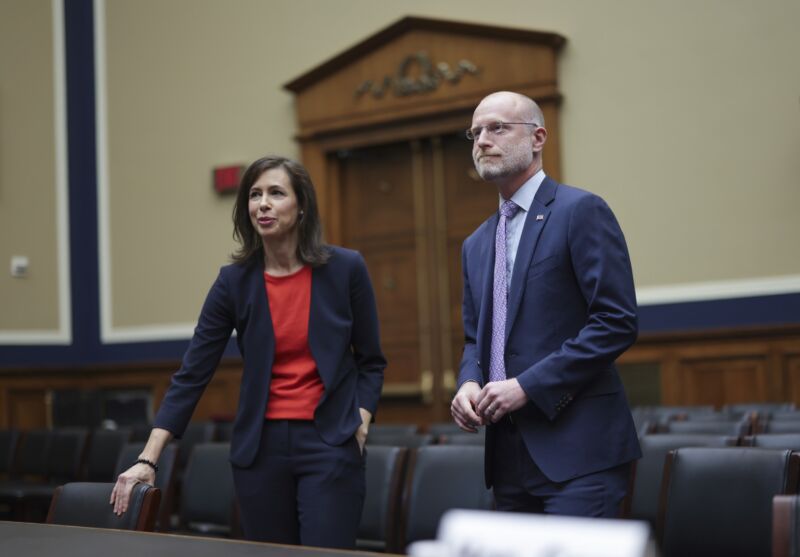Net neutrality delay —
Court delays FCC rules until August 5, asks sides for briefs on Brand X.

Enlarge / FCC Chairwoman Jessica Rosenworcel and FCC Commissioner Brendan Carr arrive to testify during a House committee hearing on March 31, 2022, in Washington, DC.
Getty Images | Kevin Dietsch
A federal court on Friday temporarily stayed enforcement of net neutrality regulations but has not decided on the merits of a telecom-industry request to block the rules on a longer-term basis.
The Federal Communications Commission’s revived net neutrality rules were scheduled to take effect on July 22. But the US Court of Appeals for the 6th Circuit needs more time to consider the industry motion to block the rules and wants the parties to file supplemental briefs. As a result, the FCC can’t enforce the rules until at least August 5.
“To provide sufficient opportunity to consider the merits of the motion to stay the FCC’s order, we conclude that an administrative stay is warranted. The FCC’s order is hereby temporarily stayed until August 5, 2024,” the court said on Friday.
The administrative stay is due in part to the 6th Circuit Court’s consideration of Supreme Court precedent. The Supreme Court’s decision last month in Loper Bright Enterprises v. Raimondo limited the regulatory authority of federal agencies by overturning the 40-year-old Chevron precedent. Chevron gave agencies leeway to interpret ambiguous laws as long as the agency’s conclusion was reasonable.
Briefs on Brand X
The telecom industry and FCC already filed briefs on the impact of Loper Bright. But the 6th Circuit wants supplemental briefs on a related topic.
Chevron deference was crucial in the 2005 Brand X ruling that has repeatedly played a role in cases over the FCC’s ability to regulate net neutrality. Brand X allowed the FCC to classify cable Internet as a lightly regulated information service. The precedent helped the FCC win court cases both when the Obama-era commission implemented net neutrality rules and when the Trump-era commission repealed those same rules.
On Friday, the 6th Circuit said the judges’ panel considering the present case “would be grateful for supplemental briefs by the parties with respect to the application of stare decisis and National Cable & Telecom. Ass’n v. Brand X Internet Servs., to this dispute, filed no later than July 19, 2024.” (Stare decisis is the “doctrine that courts will adhere to precedent in making their decisions.”)
The Supreme Court overturning Chevron doesn’t automatically nullify Brand X. The Supreme Court said in the Loper Bright ruling that “we do not call into question prior cases that relied on the Chevron framework. The holdings of those cases that specific agency actions are lawful—including the Clean Air Act holding of Chevron itself—are still subject to statutory stare decisis despite our change in interpretive methodology.”
The telecom industry and FCC briefs on Loper Bright both discussed Brand X, but the judges evidently want more on that topic. The 6th Circuit’s administrative stay was handed down by Chief Judge Jeffrey Sutton, Judge Eric Clay, and Judge Stephanie Dawkins Davis. Sutton was appointed by George W. Bush, while Clay is a Clinton appointee, and Davis was appointed by Biden.
FCC lost motion to move case
The administrative stay doesn’t necessarily signal anything about how the 6th Circuit judges will rule on the merits. But telcos did already win one ruling when the court rejected a motion to transfer the case.
Previous net neutrality cases were decided by the US Court of Appeals for the District of Columbia Circuit. This time, the 6th Circuit was randomly selected to hear the case in a multi-circuit lottery after telco lobby groups filed suit in seven circuits.
The FCC sought to transfer the current case to the DC Circuit, which ruled in the agency’s favor in the previous cases. The 6th Circuit denied the motion on June 28.
“When considering a motion to transfer a multi-circuit petition, we give considerable weight to our selection in the lottery. That lottery system would not mean much if a party disappointed by the luck of the draw could transfer the case to its preferred forum,” the court said.
Though the DC Circuit handled previous similar cases, the 6th Circuit said this is not merely a continuation of the earlier cases. The court also made a point of referring to the FCC repeatedly changing its position on whether broadband should be regulated as a common-carrier service.
“The DC Circuit has some familiarity with the legal classification of broadband through its consideration of prior FCC orders,” the 6th Circuit panel said. “But the FCC’s vacillating positions on the proper classification of broadband demonstrate that the prior orders do not represent the staggered implementation of a single undertaking. And, as the DC Circuit itself has explained, ‘general familiarity with the legal questions presented by a case is decidedly different from acquaintance with the proceedings that gave rise to the order in suit.'”